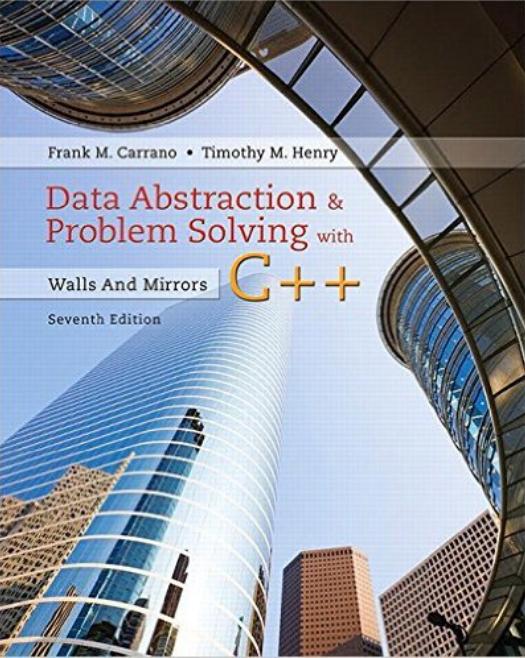Data Abstraction and Problem Solving with C++ Walls and Mirrors 7th edition by Frank Carrano, Timothy Henry ISBN 013447747 9780134477473
$70.00 Original price was: $70.00.$35.00Current price is: $35.00.
Instant download Data Abstraction & Problem Solving with C Walls and Mirrors after payment
Data Abstraction and Problem Solving with C++ Walls and Mirrors 7th edition by Frank Carrano, Timothy Henry – Ebook PDF Instant Download/Delivery: 0134477472, 9780134477473
Full download Data Abstraction and Problem Solving with C++ Walls and Mirrors 7th edition after payment

Product details:
ISBN 10: 0134477472
ISBN 13: 9780134477473
Author: Frank Carrano, Timothy Henry
This is the eBook of the printed book and may not include any media, website access codes, or print supplements that may come packaged with the bound book. For courses in C++ Data Structures Concepts of Data Abstraction and Manipulation for C++ Programmers The Seventh Edition of Data Abstraction & Problem Solving with C++: Walls and Mirrors introduces fundamental computer science concepts related to the study of data structures. The text Explores problem solving and the efficient access and manipulation of data and is intended for readers who already have a basic understanding of C++. The “walls and mirrors” mentioned in the title represent problem-solving techniques that appear throughout the text. Data abstraction hides the details of a module from the rest of the program, whereas recursion is a repetitive technique that solves a problem by solving smaller versions of the same problems, much as images in facing mirrors grow smaller with each reflection. Along with general changes to improve clarity and correctness, this Seventh Edition includes new notes, programming tips, and sample problems.
Data Abstraction and Problem Solving with C++ Walls and Mirrors 7th Table of contents:
Chapter 1: Data Abstraction: The Walls
Contents
-
Prerequisites
-
1.1 Object-Oriented Concepts
-
1.1.1 Object-Oriented Analysis and Design
-
1.1.2 Aspects of an Object-Oriented Solution
-
-
1.2 Achieving a Better Solution
-
1.2.1 Cohesion
-
1.2.2 Coupling
-
-
1.3 Specifications
-
1.3.1 Operation Contracts
-
1.3.2 Unusual Conditions
-
1.3.3 Abstraction
-
1.3.4 Information Hiding
-
1.3.5 Minimal and Complete Interfaces
-
-
1.4 Abstract Data Types
-
1.4.1 Designing an ADT: An Appointment Book
-
1.4.2 ADTs That Suggest Other ADTs
-
-
1.5 The ADT Bag
-
1.5.1 Identifying Behaviors
-
1.5.2 Specifying Data and Operations
-
1.5.3 An Interface Template for the ADT
-
1.5.4 Using the ADT Bag: Example
-
-
Summary
-
Exercises
-
Programming Problems
C++ Interlude 1: C++ Classes
-
Prerequisites
-
C1.1 A Problem to Solve
-
C1.1.1 Private Data Fields
-
C1.1.2 Constructors and Destructors
-
C1.1.3 Methods: Passing Parameters by Constant Reference
-
C1.1.4 Preventing Compiler Errors
-
-
C1.2 Implementing a Solution
-
C1.2.1 Initializers
-
-
C1.3 Templates
-
C1.4 Inheritance
-
C1.4.1 Base Classes and Derived Classes
-
C1.4.2 Overriding Base-Class Methods
-
-
C1.5 Virtual Methods and Abstract Classes
-
C1.5.1 Virtual Methods
-
C1.5.2 Abstract Classes
-
-
-
Programming Problems
Chapter 2: Recursion: The Mirrors
Contents
-
Prerequisites
-
2.1 Recursive Solutions
-
2.2 Recursion That Returns a Value
-
2.2.1 A Recursive Valued Function: The Factorial of n
-
2.2.2 The Box Trace
-
-
2.3 Recursion That Performs an Action
-
2.3.1 A Recursive Void Function: Writing a String Backward
-
Another Solution
-
-
2.4 Recursion with Arrays
-
2.4.1 Writing an Array’s Entries in Backward Order
-
2.4.2 Searching a Sorted Array: The Binary Search
-
2.4.3 Finding the Largest Value in a Sorted or Unsorted Array
-
2.4.4 Finding the kth Smallest Value of an Unsorted Array
-
-
2.5 Organizing Data
-
2.5.1 The Towers of Hanoi
-
-
2.6 More Examples
-
2.6.1 The Fibonacci Sequence (Multiplying Rabbits)
-
2.6.2 Organizing a Parade
-
2.6.3 Choosing k Out of n Things
-
-
2.7 Recursion and Efficiency
-
Summary
-
Exercises
-
Programming Problems
Chapter 3: Array-Based Implementations
Contents
-
Prerequisites
-
3.1 The Approach
-
3.1.1 Core Methods
-
3.1.2 Using Fixed-Size Arrays
-
-
3.2 An Array-Based Implementation of the ADT Bag
-
3.2.1 The Header File
-
3.2.2 Defining the Core Methods
-
The Constructor
-
The Method Add
-
The Method toVector
-
The Methods getCurrentSize and isEmpty
-
-
3.2.3 Testing the Core Methods
-
Getting Ready
-
A Test Program
-
-
3.2.4 Implementing More Methods
-
The Method getFrequencyOf
-
The Method contains
-
-
3.2.5 Methods That Remove Entries
-
The Method remove
-
The Method clear
-
-
3.2.6 Testing
-
-
3.3 Using Recursion in the Implementation
-
3.3.1 The Method getIndexOf
-
3.3.2 The Method getFrequencyOf
-
-
Summary
-
Exercises
-
Programming Problems
C++ Interlude 2: Pointers, Polymorphism, and Memory Allocation
-
Prerequisites
-
C2.1 Memory Allocation for Variables and Early Binding of Methods
-
C2.2 A Problem to Solve
-
C2.3 Pointers and the Program’s Free Store
-
C2.3.1 Deallocating Memory
-
C2.3.2 Avoiding Memory Leaks
-
C2.3.3 Avoiding Dangling Pointers
-
-
C2.4 Virtual Methods and Polymorphism
-
C2.5 Dynamic Allocation of Arrays
-
C2.5.1 A Resizable Array-Based Bag
-
-
People also search for Data Abstraction and Problem Solving with C++ Walls and Mirrors 7th :
data abstraction and problem solving with c++ 7th edition
what are data abstraction
what is data abstraction with example
explain data abstraction with an example
data abstraction & problem solving with c++
Tags: Frank Carrano, Timothy Henry, Data Abstraction, Walls and Mirrors


